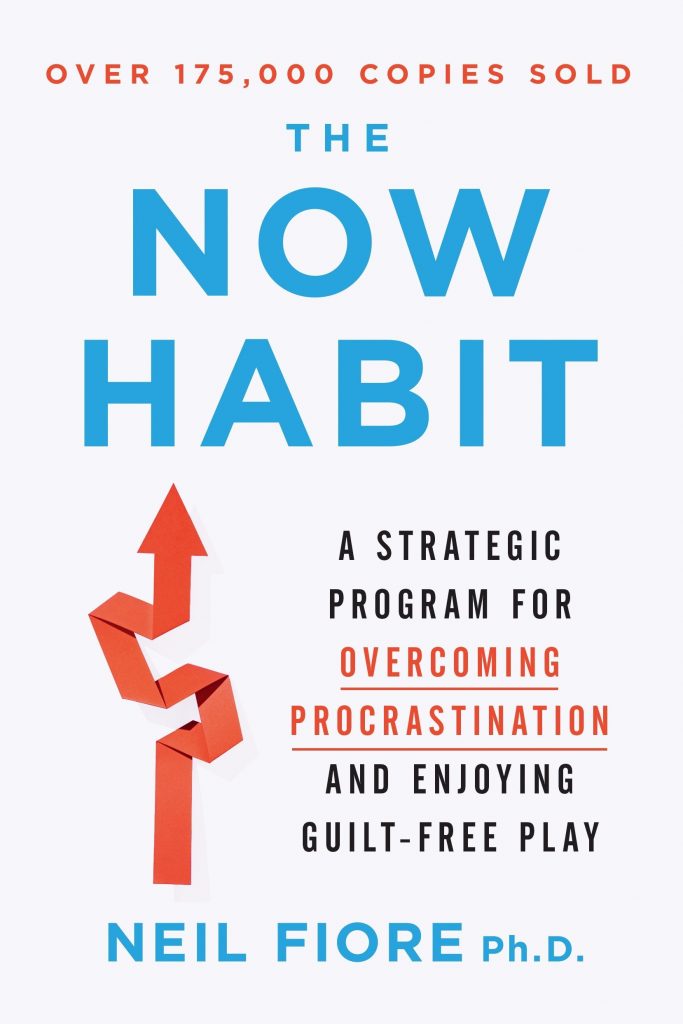 |
Title: The Now Habit |
| Author: Neil Fiore | |
| Publisher: Penguin | |
| ISBN-10: 1585425524 | |
| ISBN-13: 978-1585425525 | |
| Buy from: Amazon.in | Amazon.com |
Introduction
Through the title ‘The Now Habit’, the author Dr. Neil Fiore, a psychologist, trainer and the author of six books on psychology, tells us that procrastination is not an in-born or ingrained trait. There are specific triggers that cause us to put off things until absolutely necessary or to completely all that we need to do. By scientifically approaching procrastination, tracking it and building plans, one can bust the world’s #1 productivity killer.
Procrastination is not laziness
Most people, especially children, who procrastinate are on the receiving end of reprimands. They are thought of as lazy people with lack of will to push through a pile of work. They are seen as people with terrible discipline. The measure is often to punish them or use fear to force them to get to work. That may be counter-productive.

Usually, people who put off things in one area of life may be immaculate in another. E.g. a student may put off studies until the day of the exam, but may be the first to make it to the training ground during sports day. A self-hosted professional may be on top of her income, expenses and cash flow, but her desk might be a pile of clutter.
Dr. Fiore enumerates the following reasons for procrastination.
Anxiety about outcome: The possibility of failure is one of the biggest turn-offs due to which even the most hard-working people procrastinate.
Boredom of process: The person does not enjoy the process. This causes him/her to get distracted from the task at hand.
Resentment of authority: A strong authority that sets stringent rules and uses fear as upper hand will often run into subordinates who start resenting authority and rebel against tasks to be done.
Fear of success: Yes, this is not a typo. People do fear success. Why? Success brings with it a radical change of lifestyle. With success, your present life might be thrown out of gear and new challenges crop up. E.g. most executives find life miserable right after a promotion. Their celebration turns to dismay as they have to shoulder more responsibility and watch over a bigger team. Athletes have to live up to higher expectations.
Procrastination pattern and breaking it
When overwhelmed by a task due to the above 5 reasons, we usually fall back to activities that lull us into a false sense of familiarity and comfort. Burying self into email and social media, obsessive cleaning and taking too many breaks are sure-fire symbols that you are procrastinating on something that is putting you off your comfort zone. The pattern of procrastination is only broken by three things:
a. A task is well within your comfort zone,
b. Not doing a task leads to a bigger crisis than the failure of the original task,
c. The effects of failure can be reversed by another task.
Dr. Fiore likens this to walking on a narrow wooden plank. If you were given a task of walking on a wooden plank which is placed on the floor, the task is well within your comfort zone and you’ll waste no time running across it.
If the plank is now raised 100 feet above the ground between two buildings and you can look at the ground far below, your mind starts thinking about the consequences of a mistake and a doomed fall. This is your mind frozen into procrastination.
But if you are on a plank raised 100 feet above the ground with a fire catching up to you from behind you, then you will push yourself on top of the plank. You will find creative ways like moving on the plank in a sitting position or even crawling across. But you won’t stop on the building with fire. You’d prefer to live a few more moments and hopefully tip-toe your way to the other building.
The best situation is if there is a safety net about 20 feet below the plank. In this case too, you will start towards the other building with healthy fear, but you will have an assurance that the safety net will catch you.
Summarising the four patterns, here are some solutions to bust procrastination.
a. Break an overwhelming task into smaller tasks well within your comfort zone.
b. Set the consequences of inaction to be more severe than that of failure.
c. Make a plan B that will cut the losses of failure from your original plan.
Language of procrastinators and productivists

Procrastinators choose to use words that signal obligation, force and having to push against unwillingness. Changing those words will often put you in control of your situation and spur you into action. Here are 5 examples from the book.
Bad: I have to / must do this.
Good: I choose / get to do this.
Bad: I must finish this by ….
Good: I will start now. The finishing will take care of itself.
Bad: This is overwhelming.
Good: Here is my next step.
Bad: I must be perfect and should not make mistakes.
Good: I can be perfectly human and make a few mistakes to learn from.
Bad: I have work all day. I have no time for fun.
Good: I must make time for fun. I will use the remaining time to work efficiently.
Guilt-free play
There are two extremes when it comes to productivity. One is a procrastinator who puts things off. On the other end is a workaholic who is obsessed with work. A procrastinator does not choose to have fun because of the guilt of not having enough. He/she reasons that not much got done, so they need to stay back and work and sacrifice all the fun activities. A workaholic suffers from the illusion of efficiency. He/she believes that every second of the day must be used productively. That forces him/her to never schedule fun.
The right balance is to introduce fun into your every living day. In fact, you should go as far as to SCHEDULE part of the day to be fun and not be trapped by work. Fun recharges your mind and body. This means that you will come to work with the right mindset. Commitment to fun indirectly means commitment to good work and productivity.
The Unschedule

True to the topic ‘guilt-free play’, Dr. Fiore suggests a method of scheduling your calendar called ‘Unschedule’. In this counter-intuitive method, you will commit to certain days in the year and certain times in the day for fun and celebration. E.g. you should schedule the entire day of Diwali or Christmas completely off as spending with your family. You should pre-commit family trips on calendar.
During the day, you can choose times such as evenings or nights to spend with friends or family or even aloof with yourself. Whatever you do, you shouldn’t schedule work. You are promising to yourself that you’ll have only fun during those time blocks / days.
In the time that remains, you should schedule your work such that you do fully focused bursts of work for at least 30 minutes. During those thirty minutes, you should cut off the entire world and focus only on the work at hand. Interruptions should be deferred, promising to act on them later. There should be a rewarding fun activity scheduled after every 30-minute block.
The Unschedule is beneficial for the following things.
a. It recognises that your life is not all about work. It also means devoting time to yourself and the people you love.
b. After accounting for all the fun, you will realise how much time you realistically have per day for work.
c. It locks you into efficient blocks of 30 minutes of uninterrupted work.
d. Every 30 minute block of efficient work is rewarded with a fun activity.
Conclusion
Dr. Fiore’s rather unconventional method suggests that you should not worry about finishing your task or the outcome. Instead he suggests that you start a task and take the next right step. The flow will take care of the results. Also, Dr. Fiore rather counterintuitively suggests that you should schedule all your leisure activities in your day and schedule all your work in the gaps between leisure. After reading his book, I have tried his methods for more than a month. They do work wonders. Now its your run. Grab the book, read it and put its wisdom to test. You will surprise yourself.

We know you love books. We would you like to give two FREE audio books. Grab your trial Audible Membership with Two Free Audio Books . Cancel at anytime and retain your books.